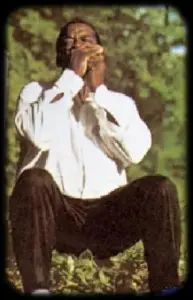PAPA GEORGE LIGHTFOOT
 When producer Steve LaVere discovered that Papa George was still blowing his harp in his native Natchez MS in 1969, he whisked him into Malaco’s new Jackson studios to record some real down-home country Blues harp. Papa George’s habit of singing through his harp-mic gave his already rough voice a ragged edge, but his instrumental technique was superb, as displayed on the resulting ‘Natchez Chase’ albums.
When producer Steve LaVere discovered that Papa George was still blowing his harp in his native Natchez MS in 1969, he whisked him into Malaco’s new Jackson studios to record some real down-home country Blues harp. Papa George’s habit of singing through his harp-mic gave his already rough voice a ragged edge, but his instrumental technique was superb, as displayed on the resulting ‘Natchez Chase’ albums.
Born in Natchez in 1924, Alexander Lightfoot first recorded for Peacock as one of The Gondoliers, with pianist Tommy Ridgley, backing various singers in Houston. As a solo artist, Papa George cut a few tracks in New Orleans which were released by Aladdin Records, and in 1953 he cut some fine Blues in New York with ‘Champion Jack’ Dupree.
Old school Blues harp boogie like you’ve never heard before;
Papa George Lightfoot Discography
Great re-mastered version of the original 1969 Malaco album. If you can hunt down the Ace Records import version, it has six extra tracks.